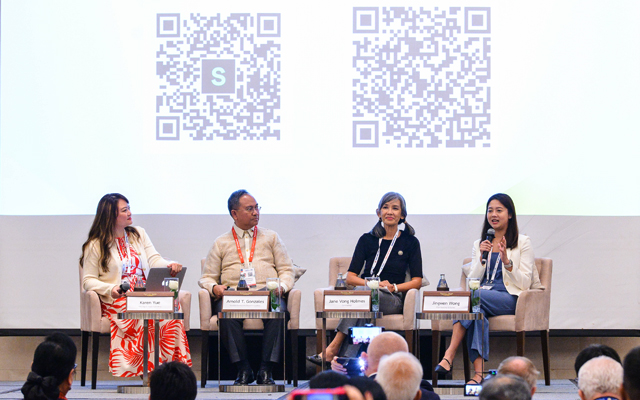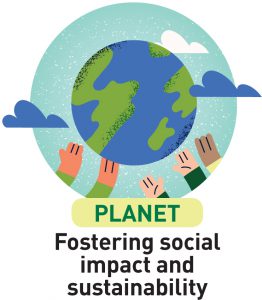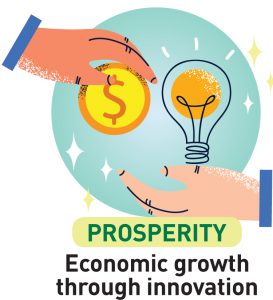The future of events through the lens of people, planet, and prosperity.

As the events industry evolves, it is increasingly defined by three interconnected pillars: People, Planet, and Prosperity. This framework emphasises participant-centric experiences, environmental sustainability, and meaningful economic impact. The future of events lies in their ability to blend immersive engagement with purpose-driven outcomes that resonate on all three fronts.
 Today’s events are centred on the participant, moving away from the rigid, compartmentalised formats of the past. Instead, they now embrace open, unconfined spaces that foster immersive, fluid experiences, allowing participants to engage more naturally and organically.
Today’s events are centred on the participant, moving away from the rigid, compartmentalised formats of the past. Instead, they now embrace open, unconfined spaces that foster immersive, fluid experiences, allowing participants to engage more naturally and organically.
David Barrett, MICE consultant at The Slate and founder of DBC Group, explained: “Ten years ago, events were all content-driven. Today, the approach is participant-first: immersive, personalised, and engaging, with content evolving to meet the needs of the audience.”
Jingwen Wong, meetings & events leader for Southeast Asia and China at FCM Meetings & Events, noted that events are no longer a “one-way delivery”, as attendees now expect active participation and to be “part of the action”.
Modern audiences demand shorter, high-impact sessions that are like “TEDx talks on steroids”, observed Barrett.
“Digital technology has also built a greater community spirit within events, enabling instant updates, photo-sharing, and personalised communication through apps,” he said.
Expectations for wellness and flexibility have also reshaped event formats. Ravi Ganglani, general manager of Avani+ Hua Hin Resort, said: “Gone are the days of sitting for eight to nine hours straight with only a lunch break. We offer a physiotherapist during breaks to teach attendees how to maintain good posture and avoid fatigue throughout the day.”
Inclusive innovations such as decompression rooms featuring low-stimulation environments, flexible mealtimes, resting areas, and all-day snack stations with healthy options, as seen at mega-events like Devcon 7 in Bangkok, reflect the shift toward creating more holistic, participant-driven experiences.
Embracing localisation
Immersive storytelling and local culture are now vital components of event programming, observed business events veterans.
“Integrating storytelling and local culture into our events not only serves to forge a deeper connection with the destination for attendees; it also makes the experience more memorable,” said Arnold T Gonzales, acting head, MICE department, Philippines’ Tourism Promotions Board.
Employing heritage spaces, and showcasing local performances and local fare are no longer mere add-ons – they are an integral part of immersive and authentic business events.
Chiruit Isarangkun Na Ayuthaya, president, Thailand Convention and Exhibition Bureau (TCEB), said there is a focus on developing local experiences that are suitable for business events.
“We have a long list of local experience offerings throughout Thailand, some of which can be used for carbon offsetting,” he added.

Noor Ahmad Hamid, CEO of PATA, emphasised that as destinations compete for major events, the focus on legacy has evolved.
“Legacy now focuses on long-term benefits such as knowledge transfer, job creation, environmental sustainability, and social engagement,” Noor explained.
Peeradorn Kaewlai, associate professor of urban planning at Thammasat University, noted that event legacy needs to be considered from the outset, and integrated into the bidding and planning process.
The global push for sustainability has also revolutionised event management. Today’s events aim to minimise their environmental footprint through net-zero goals, waste reduction, and sustainable practices.
At Thailand Travel Mart Plus 2024, the Tourism Authority of Thailand (TAT) implemented a zero-waste initiative with sorting stations at all side events. Partnering with JW Marriott Khao Lak Resort, surplus food from the event was distributed to local schools.
Similarly, TAT’s Amazing Green Fest in Bangkok showcased innovative waste management practices, such as sorting stations for waste hosted in conjunction with local social enterprise The Geen.
TAT governor Thapanee Kiatpaiboon has also backed a push to elevate local sustainability standards in line with the values of longhaul markets such as Europe and the US.
Leveraging technology for sustainability
AI, virtual reality, and digital tools are now essential in delivering seamless, personalized event experiences, noted FCM Meetings & Events’ Wong. She said: “Today’s attendees expect everything at their fingertips – from the agenda to networking opportunities.”
AI-summary tools such as Gevme’s Snapsight, AI-MCs like those used at Thailand Innovative Meetings Exchange 2024, and AI concierges such as DevAI – integrated into Devcon 7’s event app to answer participant FAQs – demonstrate how technology is reshaping the industry.
Daniel Tjan, director of business innovation at Gevme, whose products include Snapsight, Spark AI, and the Sustainability Hub for Events to support net-zero event planning, said: “Gevme’s AI-driven solutions have transformed event planning and execution. By automating routine tasks and offering real-time insights, our tools allow event professionals to focus on strategic elements, enhancing both engagement and satisfaction. AI-powered content summarisation is setting new standards, delivering more personalised experiences for attendees.”
Tjan predicts that the future of events will increasingly be hybrid. “AI will play a pivotal role in personalising attendee journeys, predicting preferences, and enhancing onsite experiences. Sustainability and inclusivity will also be central, with technology broadening participation and reducing environmental impact,” he said.
Barrett also highlighted the shift from traditional printed signage and build-ups to inbuilt LED screens.
“Tech is here to stay,” he stated, noting how these innovations not only reduce waste but also enhance visual aesthetics.

According to Wong, businesses now prioritise time efficiency, which has resulted in a shift from Return on Investment (ROI) to Return on Time (RoT).
“Corporates are selecting events that truly deliver impactful outcomes. It’s no longer about the number of events but about their ability to deliver value in a short span,” Wong elaborated.
The fusion of business with leisure, or bleisure, is another driver of economic growth.
Wallapa Traisorat, CEO and president of Asset World Corporation (AWC), told TTGmice that the group has seen its F&B revenue in Bangkok surge 30 per cent post-Covid due to the growing trend of merging leisure and business. In response, AWC has invested in the new four-storey EA Rooftop complex, which features over 8,200m2 of casual chef’s table experiences for hundreds of guests at a time.
Festivalisation, seen at events like Money 20/20 FinTech or Devcon in Bangkok, combines cultural elements with traditional formats to attract diverse audiences and create memorable experiences.
According to Chiruit, TCEB’s MiceNext strategy aims to create a “festival economy.”
“We are witnessing a transformation in events, blending traditional formats like conferences, tradeshows, meetings, and incentives into dynamic hybrids. Festivals are becoming a cornerstone of the business events industry, redefining boundaries and emphasising experiential engagement. Even conventional exhibitions or business events can adopt a festival-like approach,” he observed.
Upskilling for the future
The digital age has led to industry disruptions; empowered corporate clients with destination knowledge are bypassing traditional intermediaries like local event planners. Direct communication between overseas corporates and DMCs is becoming more commonplace, forcing DMCs to enhance their offerings.
“Planners now expect more from DMCs, as clients arrive well-informed about destinations through online research and AI tools. The pandemic has also compressed event timelines, with 18-month preparations sometimes condensed to just six weeks, pushing planners to deliver quality under tight deadlines,” Barrett noted.
Far-sighted destination leadership knows work must have been done yesterday to prepare business events professionals for today, and have been investing in industry talent development.
Gonzales highlighted the Philippines’ efforts to train local communities: “We’re investing heavily in training programmes for the next generation of professionals, ensuring they can deliver the personalised, tech-enabled experiences that clients now expect.”













